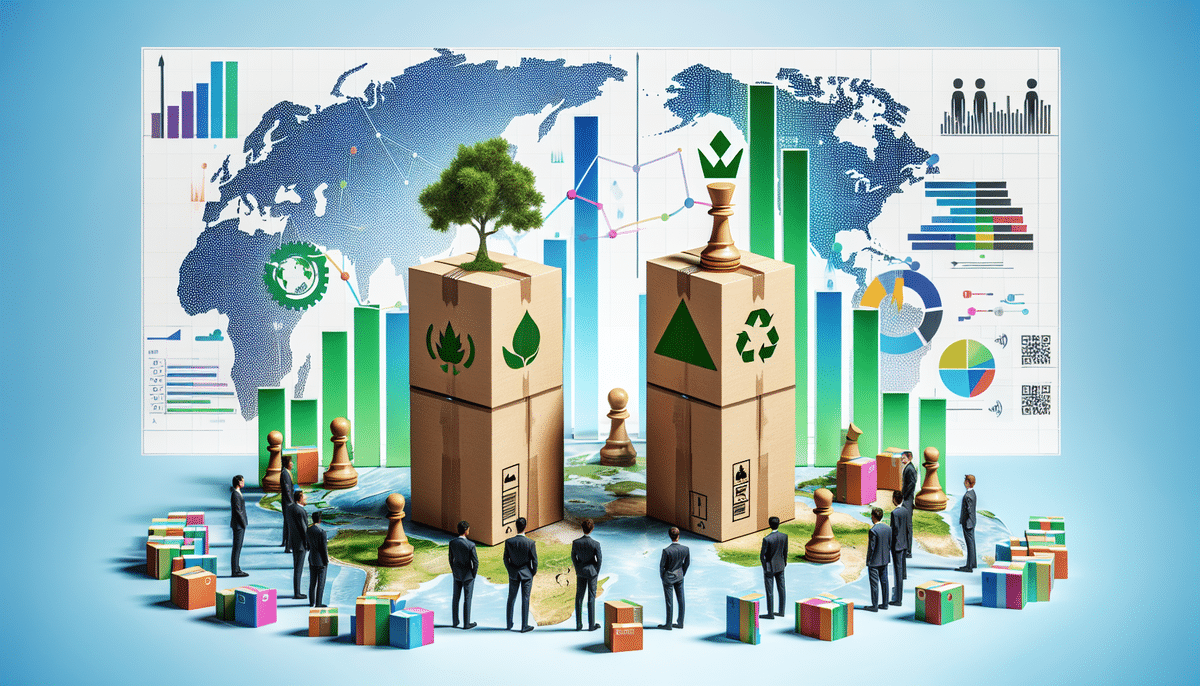Introduction to Packaging Corporation of America (PCA) and Georgia-Pacific
In the competitive paper packaging industry, Packaging Corporation of America (PCA) and Georgia-Pacific stand out as two of the leading companies. Both organizations offer a diverse range of products and services, but they differ in their histories, financial performance, sustainability initiatives, and corporate structures. This comprehensive analysis delves into these aspects to provide a clear comparison between PCA and Georgia-Pacific.
Company Histories and Corporate Structures
History of Packaging Corporation of America
Packaging Corporation of America (PCA) was established in 1959 through a joint venture among several paper and packaging firms. Over the decades, PCA has grown to become one of the largest producers of containerboard and corrugated packaging products in the United States, with a strong emphasis on innovation and customer service.
History of Georgia-Pacific
Georgia-Pacific has a longer history, dating back to 1927. It has evolved into one of the world's foremost manufacturers of tissue, pulp, paper, packaging, building products, and related chemicals. In 2005, Georgia-Pacific became a subsidiary of Koch Industries, enhancing its operational capabilities and market reach.
Corporate Structure and Leadership
PCA operates as a publicly traded company, headquartered in Lake Forest, Illinois, and is led by CEO Mark Kowlzan. The company employs over 14,000 individuals and is divided into segments including Packaging, Paper, and Corporate & Other. On the other hand, Georgia-Pacific, under Koch Industries, is headquartered in Atlanta, Georgia, with a workforce exceeding 30,000 employees worldwide. Its operations are categorized into Building Products, Consumer Products, Packaging, and Cellulose divisions.
Product Offerings and Manufacturing Processes
Products and Services Offered
Both PCA and Georgia-Pacific offer an extensive range of packaging products and services. PCA specializes in containerboard, corrugated packaging, paperboard, and packaging machinery, catering to industries such as food and beverage, personal care, and healthcare. Georgia-Pacific diversifies further by including building materials alongside its packaging solutions, making it a versatile player in the industry.
Manufacturing Processes Comparison
PCA focuses primarily on corrugated packaging and operates multiple containerboard mills across the U.S., enabling efficient production and distribution. In contrast, Georgia-Pacific's manufacturing processes are more diversified, encompassing a broader spectrum of pulp, paper, and packaging products. This diversification allows Georgia-Pacific to address a wide array of market needs effectively.
Product Distribution Networks
Both companies boast extensive distribution networks that facilitate nationwide and international reach. PCA and Georgia-Pacific utilize a combination of direct sales and various distribution channels to ensure timely delivery and customer satisfaction. Their robust logistics capabilities enable them to serve a diverse client base effectively.
Financial Performance
Comparative Financial Overview
While Georgia-Pacific is a privately held company and does not disclose its financials publicly, PCA has reported a net income of $636 million in 2020 with net sales reaching approximately $7.0 billion. This financial strength underscores PCA's significant presence and stability in the market.
Sustainability Practices
Environmental Initiatives
Sustainability is a pivotal focus for both PCA and Georgia-Pacific, driven by increasing consumer and regulatory demands for environmentally friendly packaging solutions. PCA is certified under the Sustainable Forestry Initiative (SFI) and employs a closed-loop recycling system to minimize waste. Georgia-Pacific commits to sustainable forestry practices and has invested in renewable energy sources such as biomass and wind power to reduce its carbon footprint.
Adapting to Sustainable Consumer Demands
- PCA:
- Implemented a closed-loop recycling system.
- Developed biodegradable and compostable packaging materials.
- Georgia-Pacific:
- Invested in advanced recycling technologies.
- Partnered with the Recycling Partnership to enhance community recycling access.
- Committed to using 100% recycled content in packaging by 2025.
- Introduced compostable foodservice packaging made from renewable resources.
Environmental Impact of Production Processes
Both PCA and Georgia-Pacific have pledged to reduce their environmental impact through various initiatives. PCA focuses on energy conservation, waste reduction, and sustainable forestry practices, while Georgia-Pacific emphasizes the use of renewable energy, reducing greenhouse gas emissions, and implementing eco-friendly manufacturing processes.
Market Position and Competitive Landscape
Industry Competition
The paper packaging industry is highly competitive, with major players including International Paper, WestRock, and Smurfit Kappa alongside PCA and Georgia-Pacific. These companies compete on factors such as sustainability, innovation, and customer service to capture market share.
Government Regulations and Competition
Government regulations play a significant role in shaping the competitive landscape of the paper packaging industry. Environmental regulations, trade policies, and labor laws influence how companies like PCA and Georgia-Pacific operate and compete. Compliance with these regulations is essential for maintaining market presence and avoiding legal repercussions.
Customer Satisfaction and Future Prospects
Customer Reviews and Satisfaction
Customer satisfaction for both PCA and Georgia-Pacific varies by product and region. Generally, both companies are lauded for their quality and reliability. For detailed customer feedback, visit the Customer Reviews page.
Future Prospects in the Paper Packaging Industry
The paper packaging industry is expected to continue growing, driven by the expansion of e-commerce and the increasing demand for sustainable packaging solutions. PCA and Georgia-Pacific are well-positioned to leverage these trends through their extensive product offerings, commitment to sustainability, and ongoing investments in innovation.
Investment in Research & Development
Both PCA and Georgia-Pacific recognize the importance of innovation in maintaining competitiveness. They invest significantly in research and development to create new products and technologies, focusing on sustainable materials and advanced packaging solutions that meet evolving consumer needs.
Response to COVID-19 Pandemic
Industry Impact and Company Strategies
The COVID-19 pandemic had a profound impact on the packaging industry, with a surge in online shopping and home deliveries. In response, PCA and Georgia-Pacific implemented stringent safety protocols to protect their employees, scaled up production to meet increased demand, and developed new packaging solutions tailored to the changing market landscape.
Marketing Strategies Employed
Approaches to Market Penetration
PCA and Georgia-Pacific employ diverse marketing strategies to enhance their market presence, including:
- Comprehensive advertising campaigns targeting specific industries.
- Active participation in trade shows and industry conferences.
- Targeted promotions tailored to different market segments.
- Investment in online marketing and social media outreach to engage with a broader audience.
Working Conditions in Factories
Commitment to Employee Welfare
Both PCA and Georgia-Pacific prioritize creating safe and healthy workplaces. They implement comprehensive safety protocols, provide regular training, and offer employee benefits to support their workforce. However, working conditions can vary across different facilities and locations, reflecting each company's adherence to local regulations and standards.
In conclusion, while PCA and Georgia-Pacific each have unique strengths in their histories, product offerings, and corporate structures, both remain pivotal players in the paper packaging industry. Their commitment to sustainability, innovation, and customer satisfaction positions them well for continued growth and leadership in the market.








